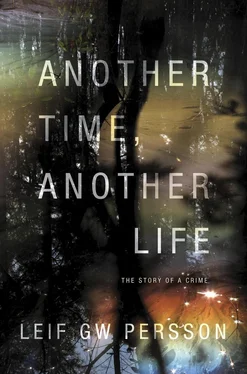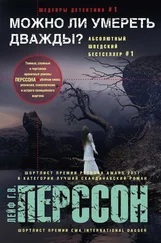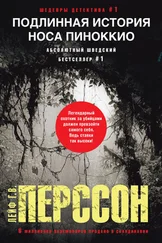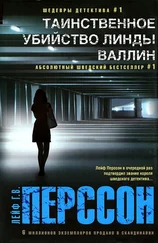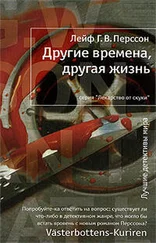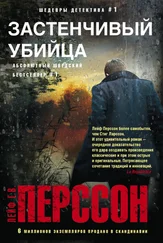“Yes,” said Johansson. “Why didn’t he?”
“Yup,” said Persson, sighing. “That was before my time. You should really ask Berg about it, but...”
“I’m asking you instead,” said Johansson.
“I know,” said Persson, suddenly looking rather mournful. “Erik’s wife called before you showed up.”
“How are things with him?” said Johansson.
“He’s dying,” said Persson. “So... that’s how it is with him. And since you’re asking, as far as I’m concerned he should have been able to live to the end of his life. Sixty-five is no great age, is it?”
No, thought Johansson. Sixty-five is no great age. Not when you’ve passed fifty, like he had, or would soon turn sixty-seven, like his colleague Persson in the armchair across from him.
“There were certainly several reasons that Eriksson and his friends were not brought in,” said Persson. “I’m a policeman, so politics has never been my strong suit, but if you ask me...” Persson shook his head and poured another cognac.
“You went in and looked at the murder investigation,” Johansson reminded him. “Why did you do that?”
“If you ask me,” said Persson contemplatively, “it was for the same reason we didn’t put little Eriksson away for his collaboration at the West German embassy.”
“And that was?” asked Johansson.
“I guess it had become a little awkward for others besides Eriksson,” said Persson. “Because he was working for us — among other things, trying to keep track of all the other student bastards who weren’t content with just throwing tomatoes at people like you and me,” said Persson.
I thought as much, thought Johansson. It was what had struck him as he sat in the taxi en route to Persson’s place.
Then they talked about Eriksson’s past as an informant for the secret police, an assignment he had devoted himself to during his entire active period within various parts of the acronym-ridden and lunatic left, counting the time from the late sixties to the mid-seventies.
“Then they hung him out to dry,” said Persson. “It was after the West German embassy that Berg decided he should be hung out to dry.”
“But you made no attempt to confront him?” Johansson asked.
Allowing for the fact that Persson himself had not been involved at that time, he was nonetheless certain that no such attempt had been made. Eriksson had been far too mixed up with the secret police for anyone to dare risk something like that. He had even been on the salary list for so-called external coworkers at Sec for a rather long time.
“The bastard swindled us out of several thousand in the midst of all this,” Persson sighed.
“You think he was playing double?” asked Johansson.
“Yes,” said Persson. “True, I never met him, but I understood from what people said that this guy was a real little dung fly. If there was any shit anywhere, he’d be sure to land on it.”
“It can’t have been the case that he was the one who infiltrated you all,” Johansson asked. And let you pick up the tab to add a little spice to the arrangement, he thought.
“No,” said Persson. “He was just the kind of guy who likes to keep his options open. We had other informants too, thank God, and you should have heard what they thought of Eriksson. At the time of the West German embassy takeover it was probably as simple as Eriksson abandoning us because he got the idea that it was probably the Red Guards who would win the day. He doesn’t seem to have been a great political thinker, and he wasn’t exactly faithful either.”
“I understand he wasn’t particularly pleasant,” said Johansson.
“A jerk,” said Persson with conviction. “Pity he was already protected when I started.”
But it was good luck for Eriksson, thought Johansson, sneaking a glance at Persson’s right hand wrapped around the cognac glass.
Eriksson had accomplices. They got off too. Johansson wanted to know why.
“There was no way to get around Eriksson, it seems,” Persson sighed. “How would that have looked? They didn’t want to bring him in, so the others he’d been in league with get off the hook too. Besides, they weren’t really much to hang on the Christmas tree... well, with one exception of course.”
“You mean Welander,” said Johansson, who had figured out a few things himself after his conversation with Wiklander.
“Fucking Red Guard,” said Persson, riled up. “For a long time I was hoping that malignant asshole would take a false step, but he was a clever bastard. He got out while there was still time.”
“What about the other two,” said Johansson with an innocent expression.
“Who do you mean?” said Persson, suddenly sounding normal again.
“Tischler and the fourth guy,” said Johansson as if he had simply forgotten the name.
“Tischler,” Persson snorted. “He only got involved using his father’s money, mostly because it was an easy way to meet willing ladies. True, I wasn’t the one who did that investigation, but if there’s anything I’ve learned it’s to separate good police work from bad, and there were no major faults with the investigation Berg ordered done. I thought you’d read it?”
“No,” said Johansson. “I’m guessing it disappeared two years ago when you pulled it out of the file.”
“Orders from Berg,” said Persson curtly, “and this isn’t me gossiping. He and I have already talked about it. And what do you mean by ‘pulled it out’ anyway? I put together what I was told to put together, placed it in a couple of binders, and gave it to Erik. It’s not my business to have opinions about what he did with it later.”
“And you have no idea what he did with it?” asked Johansson with an innocent expression.
“No,” said Persson. “You don’t ask about that sort of thing.”
Although you seem to have managed to do quite a bit anyway, thought Johansson.
How had they found out about Eriksson, Welander, Tischler, and that mysterious “fourth man” almost twenty-five years ago?
“I wasn’t there, like I said,” said Persson. “Not when it started anyway.”
“But you’ve read the investigation,” said Johansson.
“Sure,” said Persson. “I’ve spent a few hours looking at it, and like I said it was not a bad investigation. Berg ran it, and at that time he was no slouch. That I can assure you.”
“Tell me,” said Johansson.
It had not even been particularly demanding, according to Persson. Welander had evidently driven the car when the terrorists’ messages were turned over to TT and the other news agencies in the Hötorg skyscraper. Eriksson was the one who got to take the elevator up and put the message in the mailbox while Welander stayed behind in the car out on the street and waited.
“Welander was moonlighting at the TV station at that time, so it was actually a journalist at TT who was working in the Hötorg skyscraper where the TV station had an officer who recognized Welander outside the building and thought it was a strange coincidence. He tipped us off, and then Berg and the other colleagues were on a roll. Erik set up the whole apparatus,” said Persson, seeming not exactly displeased.
“The whole apparatus,” Johansson nodded, sounding just as delighted as he suddenly felt.
“The whole apparatus,” Persson nodded, “plus a lot of things that not even you and Jarnebring would have dreamed of trying.”
“So what did they do besides delivering mail?” asked Johansson. That particular detail must have suited Eriksson to a T, he thought.
“They were the ones who arranged all the practical details for the Germans,” said Persson. “Room and board, local knowledge, transport, even some of the explosives they used most likely came from their Swedish contacts. It was ordinary Swedish-made Dynamex from Nobel — our technicians figured that out — mixed with that Czech grease they always used. Welander was the boss and Eriksson was the helper, running around like a rat on fire. He also got paid, the bastard. The Germans gave him thousands of deutschmarks to buy food and drink, but for some reason it was mostly hash he put on the table for them.”
Читать дальше
